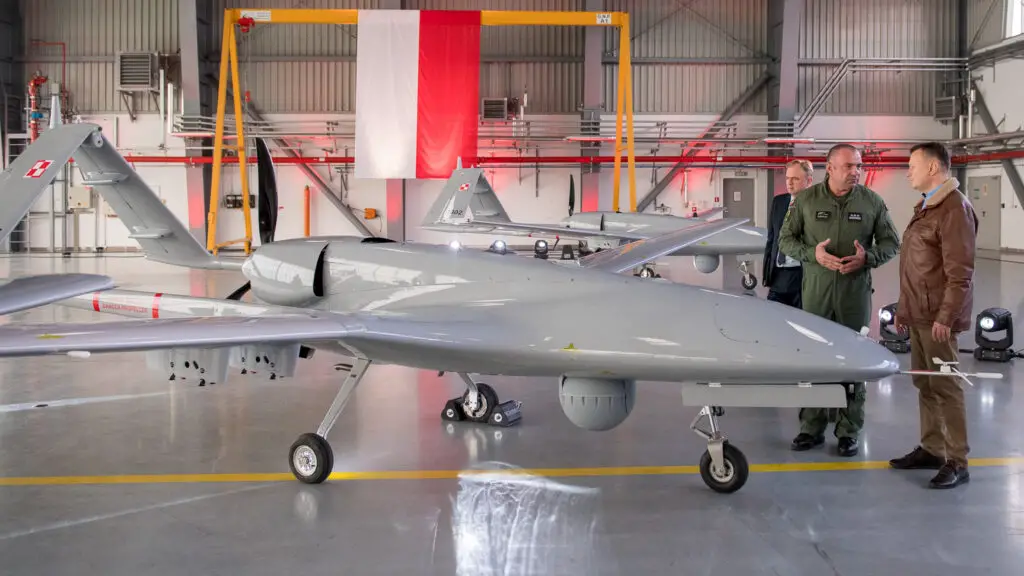On October 28, 2022, at the 12th base of unmanned aerial vehicles of the Polish Air Force in Miroslavets, the Polish Minister of National Defense, Mariusz Blaszczak, participated in the ceremony of handing over to the Polish Army the first of the ordered unmanned aerial vehicles, consisting of six Bayraktar TB2 reconnaissance and strike unmanned aerial vehicles manufactured by the Turkish Baykar Teknoloji company. The tail numbers of the first six UAVs obtained by the Polish Air Force range from “2801” to “2806.”
On May 24, 2021, the Ministry of National Defense of Poland signed a contract worth about $270 million with Baykar Teknoloji to purchase four Bayraktar TB2 unmanned aerial systems. Each complex includes three ground mobile control stations, three relay stations and six Bayraktar TB2 unmanned aerial vehicles – that is, 24 UAVs are ordered. The delivery must be made according to the schedule: the first complex by October 31, 2022, two – in April and October 2023, and the fourth – in April 2024. The Polish side signed the contract without tender procedures as part of the so-called urgent need.
The contract also includes the training of 192 Polish military personnel, including instructors and the supply of Roketsan MAM-L and MAM-C laser-guided munitions, two simulators, spare parts and the provision of a logistics package and a 24-month warranty, as well as a technology transfer providing, among other things, the possibility of maintenance and repair in Poland of engines, ground control stations and electro-optical systems of the Bayraktar TB2 UAV. To equip these UAVs, Poland is supplied with 24 L3 Harris Wescam MX-15 electron-optical systems and six sets of synthetic aperture side-looking radars.
The first group of Polish military personnel and instructors completed UAV data training at the Baykar Teknoloji training centre in Turkey in mid-September 2022.
Bayraktar TB2 UAV failed in Ukraine
At the ceremony, Blaszczak passed a controversial statement contrary to the performance of the Turkish drones in the current Russia – Ukrainian conflict. These drones have become hangar queens in Ukraine.
At the ceremony in Miroslavets, Mariusz Blaszczak said, “There is no modern army without armed drones. In the case of Bayraktar, these are drones that, on the one hand, perform reconnaissance missions and, on the other hand, will be ready to perform strike missions. This is an important stage in the process of modernization of the Polish Army, equipping the Polish Army with modern equipment. We are starting the process of equipping Bayraktar UAV military units. We ordered these drones before Russia invaded Ukraine. We were then told, especially from the opposition, the one from the Civic Platform, that this was a weapon from which we would not be of any use. What is happening in Ukraine shows that they are wrong. We were right that this is an effective weapon. This weapon in the hands of Ukrainians makes it possible to defend the territory of Ukraine effectively.”

Blaszczak was referring to the allegation that the Bayraktar TB2 are relatively simple to shoot down on a modern battlefield against a high-tech foe and that the TB2s do not necessarily need to be deployed against enemy armoured units. Having bought the Bayraktar TB2 before the Ukraine war, Blaszczak is now forced to defend the purchase, which was made purely on the hype after the Azerbaijani – Armenian conflict over Nagorno-Karabakh. As per the general narrative, the Bayraktar TB2 tilted the war’s outcome. However, the decision shows that Poland’s decision was based on the puffery created but not the ground realities. The Israeli Harpy drones were primarily responsible for the decimation of Armenian air defence, and anti-air offensive capabilities and Bayraktar TB2 UAVs operated unhindered only after that.
Poland is presenting a feeble defence for its acquisition of Bayraktar TB2 UAVs. According to the Polish reasoning, these platforms are distinguished by their ability to carry technologically advanced and rather hefty sensors and remain in the air for up to 27 hours. Consequently, Bayraktars can operate from their own lines as communication network cells (retranslators) or reconnaissance devices that adjust fire and locate targets for other combatants (including rocket artillery, anti-ship missiles or aviation). They can also provide important services during hybrid circumstances when manned aircraft dispatch is neither economical nor prudent. Combat TB2s may prove to be an ideal weapon during hybrid operations and, for instance, an enemy maritime landing where the enemy will have limited air defence capabilities as it was during the time of the battle on the Ukrainian Snakes’ Island. In their course, Bayraktars, which could engage targets up to eight kilometres away, fought with impunity, among others, against valuable and heavily armed Russian Raptor assault boats. Where the enemy’s air defence capabilities are restricted, the battle TB2s may prove to be an ideal weapon.
However, the Russians have learnt from the Ukraine war and are unlikely to make the error of not employing their advanced air defence systems in future conflicts. Poland must also explain how they will quickly transport the UAVs to the frontlines where Russian air defences are weak. Since the Russians have frequently shot down the Bayraktar, Poland must also explain if acquiring such a costly reconnaissance platform was worthwhile. The employment of less expensive Iranian UAVs in Russia has altered the conflict’s dynamics, and Poland’s decision to acquire Bayraktar TB2 UAVs will plague it for years.
